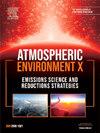仅凭车辆排放模型不足以了解交通信号时间变化的全部影响
IF 3.4
Q2 ENVIRONMENTAL SCIENCES
引用次数: 0
摘要
很少有研究考虑过交通信号时间变化对空气污染和行人暴露的实际影响,大多数研究仅从车辆排放模型中得出结论。在这里,我们考虑了英国伦敦一个路口的两种不同的周期时间,使用交通微观模拟和氮氧化物排放模型对影响进行建模,并将这些结果与在该路口进行的为期两周的实地研究中收集的氮氧化物和其他空气污染测量结果进行比较。当风向使我们的传感器位于路口的下风向时,交通流量和背景调整后的氮氧化物浓度下降了 21%,这表明干预措施是成功的。然而,当传感器位于路口上风向时,我们观察到调整后的氮氧化物浓度增加了 23%。我们测量的其他污染物二氧化氮、肺沉积表面积、黑碳和二氧化碳也发现了类似的模式。这表明,在我们为期两周的研究期间,气象因素是路边浓度的最大决定因素。在观察行人过马路的情况时,我们发现,随着过马路等待时间的增加,行人的氮氧化物暴露量增加了 46%,空气污染的潜在小幅减少被主干道上等待时间的增加所抵消。这项研究表明,除了评估超局部交通干预措施对车辆排放的影响外,还需要进行长期的实际试验,以评估气象条件和空气污染浓度变化以及行人暴露的影响。本文章由计算机程序翻译,如有差异,请以英文原文为准。
Vehicle emission models alone are not sufficient to understand full impact of change in traffic signal timings
Few studies have considered the real-world impact of changes in traffic signal timings on air pollution and pedestrian exposure with most only drawing their conclusion from vehicle emission models alone. Here, we consider two distinct cycle timings at a junction in London, UK, model the impact using a traffic microsimulation and a NOx emissions model, and compare these results with NOx and other air pollution measurements collected during a two-week field study at the junction.
Our models predict that extending the cycle time leads to a 23% decrease in NOx emissions within a 15 m radius of the junction itself. When the wind direction was such that our sensors were downwind of the junction a 21% decrease in traffic and background-adjusted NOx concentrations were seen, suggesting that the intervention was successful. However, when the sensors were upwind of the junction, we observed an increase of 23% in adjusted NOx concentrations. Similar patterns were found for the other pollutants NO2, lung deposited surface area, black carbon and CO2 we measured. This indicates that meteorology was by far the greatest determinant of roadside concentrations during our two-week study period.
Looking at pedestrian exposure for pedestrians waiting to cross the road, we found that their NOx exposure increased by 46% as waiting times to cross the road increased and that potential small reductions in air pollution were offset by increases in waiting times on the main road.
The study demonstrates the need to go beyond assessing the impact of hyper-local traffic interventions on vehicle emissions. Real-world trials over extended periods are required to evaluate the impact of meteorology and changes to air pollution concentrations and pedestrian exposures.
求助全文
通过发布文献求助,成功后即可免费获取论文全文。
去求助
来源期刊

Atmospheric Environment: X
Environmental Science-Environmental Science (all)
CiteScore
8.00
自引率
0.00%
发文量
47
审稿时长
12 weeks
 求助内容:
求助内容: 应助结果提醒方式:
应助结果提醒方式:


